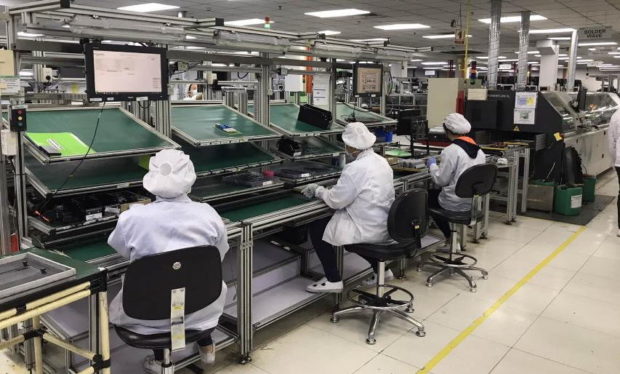
PRODUCTION CONTINUES American Power Conversion-Schneider Electric, despite a reduced workforce, continues to manufacture UPS (uninterruptible power supply) in its factory in Cavite province to meet an increased demand from hospitals and facilities catering to COVID-19 patients. —CONTRIBUTED PHOTO
SAN PEDRO CITY, Laguna, Philippines —Companies operating the country’s economic zones have shifted to manufacturing medical supplies and health-care-related products as the new coronavirus disease (COVID-19) pandemic triggered an increase in demand for hospital equipment.
Electronics companies producing computer chips, for example, are now focusing on making hospital ventilators and RxBoxes, a device that monitors a patient’s vital signs.
Those in the garment sector, meanwhile, have begun making face masks and PPE (personal protective equipment) for doctors and other medical front-liners.
In Batangas province, Taiwanese Kinpo Electronics Inc., which produces semiconductor and electronic parts, recently announced its plan to make hospital ventilators, according to Lucky Manas, the local economic zone manager.
Staying afloat
The First Philippine Industrial Park in Batangas provides two buses to shuttle hospital workers in Sto. Tomas and Tanauan cities.
The demand of the health-care sector has provided some sort of a “silver lining” to the companies, grappling to keep their operations afloat amid the outbreak, said Norma Tañag, manager of economic zones in Cavite province.
Tañag said this was also their way to make up for “canceled orders” and income losses due to disrupted supply chains.
Skeleton workforce
To slow down local virus transmission, the Philippine Economic Zone Authoritiy (Peza) has allowed companies to resume operation but only on certain conditions, like regular disinfection, strict observance of social distancing and providing for employees’ accommodation and meals during the quarantine period.
As a result, companies could only afford to operate with a skeleton workforce or 50 percent or less of their normal number of employees.
According to Peza, only 72 percent of the total number of companies in Luzon and 92 percent in the Visayas are partially operating.
In Mindanao, all companies inside economic zones are operational, it said.
The rest have stopped production because of “lack of raw materials and costly housing and shuttle [services],” said Charito Plaza, Peza director-general.
“As a [government] rule, 80 percent of the products [from economic zones] should be distributed locally,” Tañag said.
In Laguna province, the government has tapped IONICS EMS Inc. to produce RxBox for the Philippine General Hospital, a coronavirus referral center.
Exponential demand
In Cavite, the American Power Conversion-Schneider Electric continues to make UPS (uninterruptible power supply), especially with an “exponential demand” from American hospitals and facilities catering to COVID-19 patients.
President Rodrigo Duterte on Tuesday approved the recommendation of a government task force to extend the Luzon-wide lockdown until April 30. Tañag said companies could stretch their resources until the end of the month, but “beyond that, they don’t really know what to do [yet]. Medyo mahihirapan na (It will be difficult).”
Doubled production
Automotive companies Toyota and Mitsubishi, with plants in Laguna, have lent cars to the city government of Sta. Rosa for use in community hospitals.
Bread manufacturer Gardenia, which operates in Biñan City, has doubled its production volume due to an increased demand for food.
On Tuesday, Simplicio Umali, Gardenia president, said the company’s six factories nationwide were operating 24/7, despite a reduced workforce, to make 750,000 loaves of bread daily.










